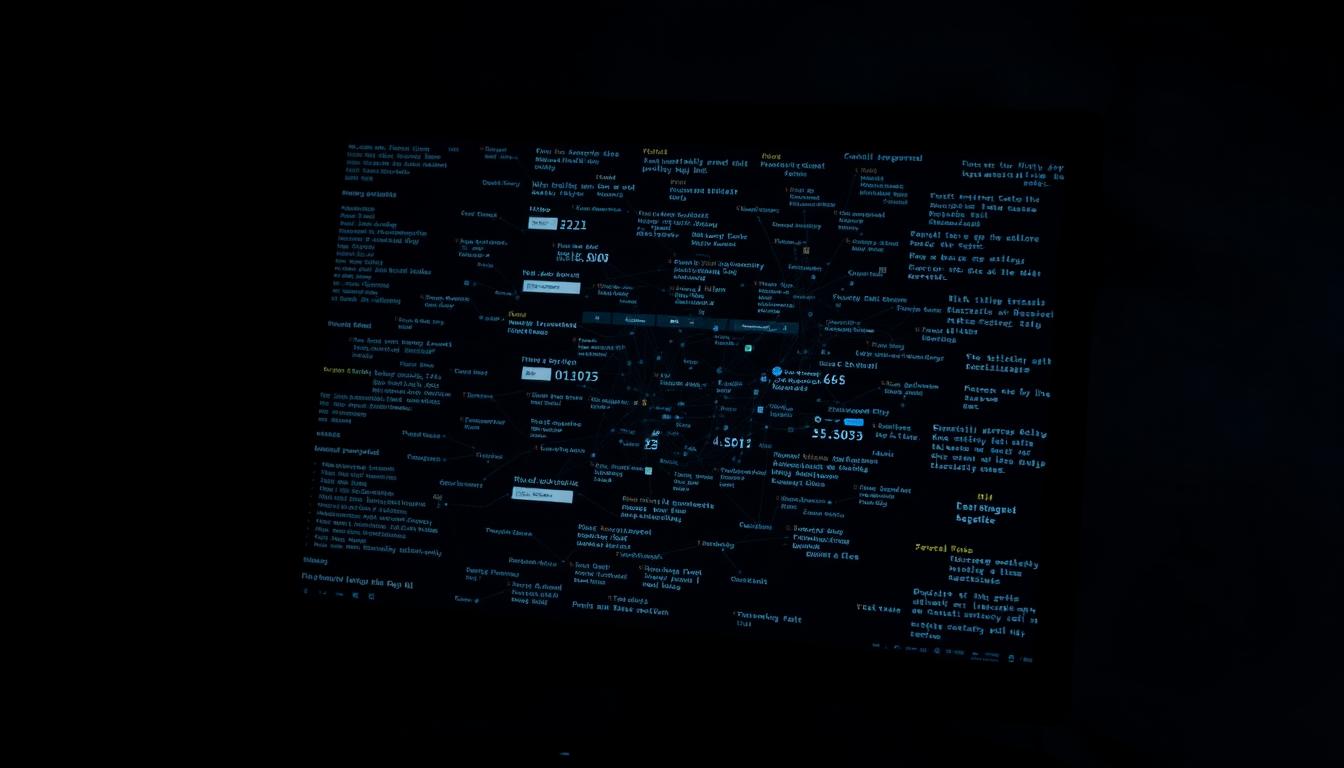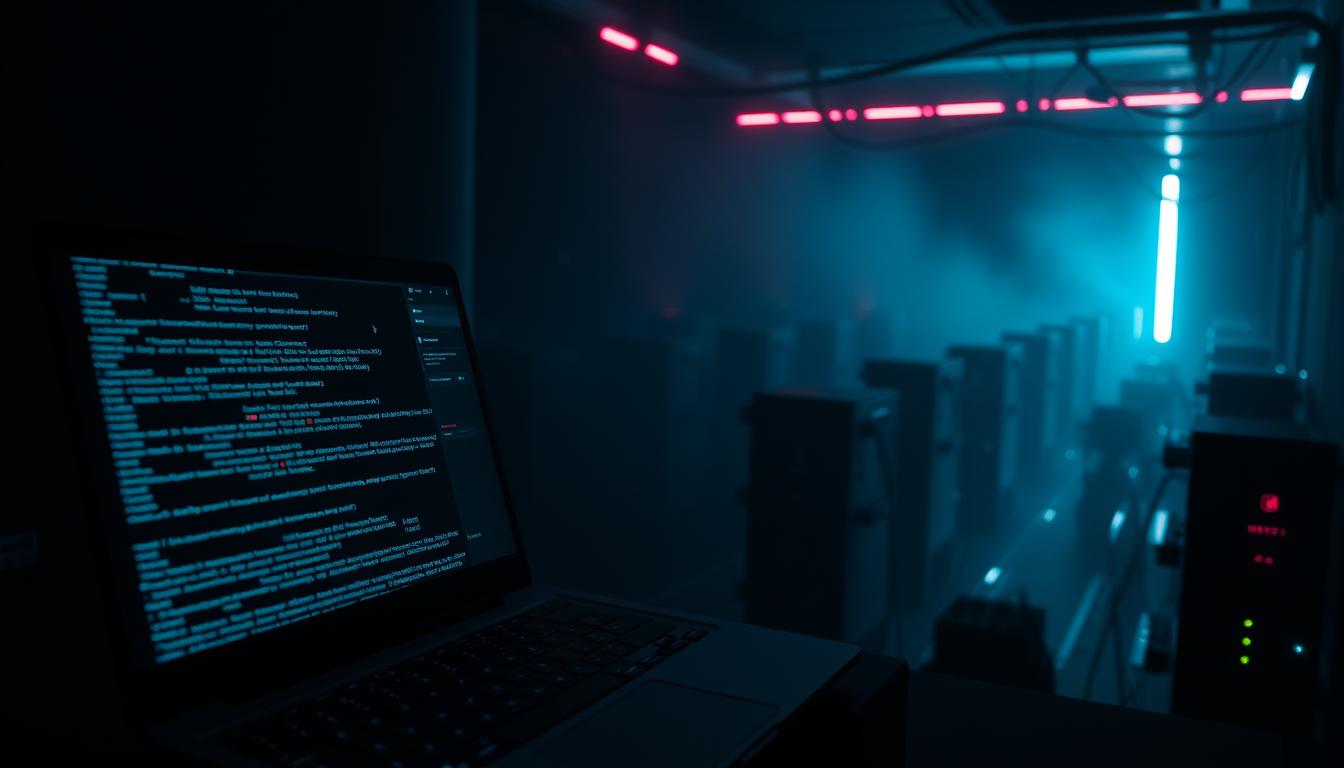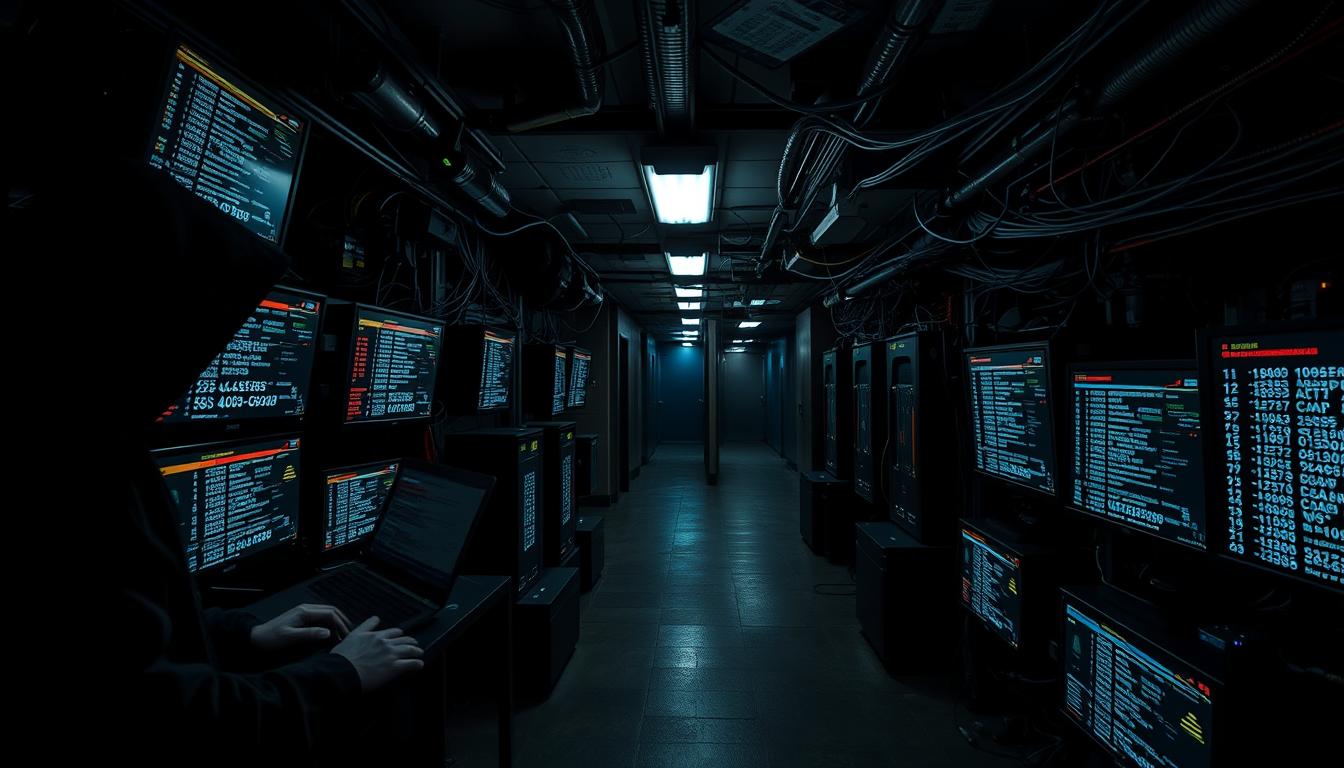Your private data could be for sale—and you might not even know it. The Darknet is a covered part of the internet. It’s where your personal info can fall into the wrong hands. Knowing about the dark web is key to keeping your online data safe.
While exploring the dark web isn’t illegal, the dangers are real. This article will teach you how your info ends up there. We’ll also cover the risks and how to protect your personal data.
Key Takeaways
- The dark web is a hidden portion of the internet not indexed by search engines.
- Your personal information could be compromised through various means.
- Understanding the dark web is crucial for cyber threat awareness.
- Illicit activities commonly occur on the dark web, often involving stolen data.
- Protecting your data requires proactive measures to prevent exposure.
Understanding the Dark Web
The dark web is a small part of the huge online world. To get it, you need to know what it is and how it’s different from the surface web and deep web. Each part of the internet has its own role and how people can reach it.
What Is the Dark Web?
The Deep web is a covered part of the internet. It’s not found by regular search engines. You need special software, like Tor, to get there. It has many kinds of content, but some of it is illegal, like drugs and stolen data.
How It Differs from the Surface Web and Deep Web
The surface web is what we see each day. It’s made up of web pages that search engines can find. The profound web, on the other hand, has private databases and systems that search engines can’t find. It’s not always bad.
When we compare the deep web and dark web, we see:
- Surface Web: You’ll be able to get to it with any browser.
- Deep Web: It has private content that search engines can’t find.
- Dark Web: It’s hard to get to and often has illegal stuff.
How Personal Data Appears on the Dark Web
Learning how personal data ends up on the dark web is key. It shows how cybercriminals get and use your personal info. Knowing these methods helps you protect your data better.
Common Ways Data Is Compromised
There are many ways to get your data. Here are a few:
- Hacking: Hackers break into databases and systems to get your info.
- Malware Attacks: Malware infects devices and steals your data.
- Phishing: Scammers pretend to be someone you trust to get your info.
These methods lead to a lot of stolen data on the dark web. Staying alert is crucial to keep your privacy safe.
The Role of Data Leaks in Data Exposure
Big data leaks from trusted sources show how easy it is for your info to end up on the dark web. These leaks can include names, addresses, and social security numbers. Big companies have been victims, showing how common data breaches are.
There are scary stats on data leaks. Many cybersecurity firms track these incidents. They show how many people are at risk because of these leaks. Seeing your info on the dark web is a big worry. It could lead to identity theft, fraud, and more.
The Stolen Data Marketplace
The dark web is home to a thriving market for stolen information. Here, you can find all sorts of personal data for sale. This incorporates credit card points of interest, social security numbers, and login credentials. Even exposed email addresses and other important info are up for grabs.
What Is Available on the Dark Web?
In this market, many types of data are traded. You’ll find:
- Credit card information: Full card subtle elements sold in enormous batches.
- Login credentials: Passwords and usernames for many websites.
- Personal identities: Complete packages with ID documents and personal history.
- Database dumps: Huge files with millions of email addresses and more.
This data is often stolen through big breaches or phishing attacks. As demand rises, so does the variety of data available.
How Hackers Sell Data
Hackers sell data on the dark web, keeping their identities secret. They utilize cryptocurrencies for exchanges, making it harder to track. They set up forums and private groups to sell their stolen data discreetly.
Some trends in this market include:
- More focus on complete identities because they’re more valuable.
- More demand for password leaks from well-known sites.
- Bulk sales of exposed email addresses, targeting certain groups.
In summary, the stolen data market is a big threat to our security. Hackers keep finding new ways to exploit us.
Cybercrime on the Dark Web
The dark web is a hotbed for cybercrime, threatening both individuals and society. It’s vital to know about these crimes to safeguard your personal info. Not knowing about these dangers can expose you to data theft and identity fraud, harming your financial and privacy security.
Types of Cybercrime Linked to the Dark Web
In this hidden world, many crimes thrive. Here are some major cybercrimes:
- Identity theft: Thieves steal your personal info to make fake profiles, causing financial loss and serious data breaches.
- Drug trafficking: Drugs are bought and sold secretly, raising the stakes for criminal activity.
- Trafficking in stolen goods: Stolen data and personal info are traded, putting your security and privacy at risk.
- Ransomware: This malware locks your files, demanding money for release, threatening your digital safety.
Impact on Personal Information and Security
Getting caught up in these crimes hurts you personally and affects society too. The connection between cybercrime and identity fraud is scary, as seen by law enforcement and cybersecurity pros. Victims often suffer:
- Financial loss from unauthorized transactions.
- Emotional distress from compromised security.
- Long-term damage to credit scores and reputation.
As the dark web grows, it’s key to follow a dark web safety guide. By understanding these threats and taking steps to prevent identity fraud, you can protect yourself from the dark web’s dangers.
Protecting Your Identity Online
In today’s advanced world, keeping your individual data secure is key. Using strong passwords, enabling 2FA, and checking for breaches are crucial. These steps help shield your identity and prevent data theft online.
Strong Password Habits You Should Adopt
Creating strong, unique passwords is your first defense. Here are some tips for better password habits:
- Use a mix of uppercase and lowercase letters, numbers, and special characters.
- Avoid common words or easily guessable info like birthdays or names.
- Change passwords often and don’t use the same one for all accounts.
By following these tips, you lower your risk of cyber attacks.
Importance of Two-Factor Authentication (2FA)
Two-factor authentication adds an extra layer of security. It makes it harder for programmers to induce into your accounts. With 2FA, you get a second check, like a text or app code. This is a big step in keeping your online info safe.
Breach Monitoring and Checking for Exposed Data
It’s imperative to keep an eye on your information for breaches. Use services that alert you to unauthorized access. Always check for data breaches involving your accounts. This way, you can act fast if your data is at risk.
Conclusion
The dark web is a complex place where personal data can be stolen easily. In this article, you’ve learned about the hidden dangers in cyberspace. You’ve seen how your data can be compromised and sold on dark marketplaces.
It’s important to stay alert about cyber threats in today’s digital world. Knowing the risks helps you protect yourself better.
Being proactive about your online security is key. Basic steps like utilizing solid passwords and observing for information breaches can help. This guide shows that keeping your personal info safe is crucial for your online security.
By being careful, you can fight against cybercrime. Keep your digital security a top priority to keep your data safe from the dark web. Keep in mind, being educated and proactive is your best defense against online dangers.








GIPHY App Key not set. Please check settings